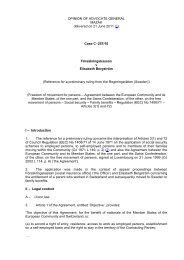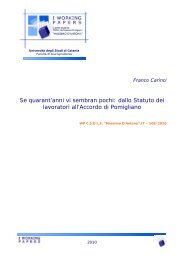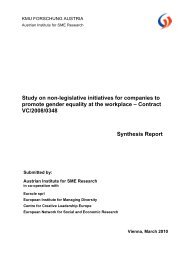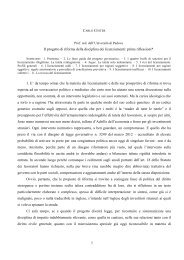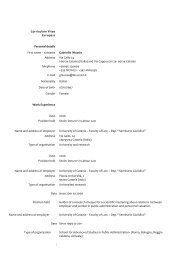Full text - European Trade Union Institute (ETUI)
Full text - European Trade Union Institute (ETUI)
Full text - European Trade Union Institute (ETUI)
You also want an ePaper? Increase the reach of your titles
YUMPU automatically turns print PDFs into web optimized ePapers that Google loves.
Temporary agency work in the <strong>European</strong> <strong>Union</strong><br />
In Greece, prohibitions and limitations already existing in national law are in<br />
full conformity with the criteria set out in Art. 4 para. 1 of Directive 2008/104/<br />
EC, so GSEE sees no need to re-examine and redefine them, especially with<br />
the prospect of abolishing them and deregulating the safeguards currently in<br />
force. This is supported by evidence based on official data showing a great expansion<br />
in the use of temporary work through agencies and of all the flexible<br />
forms of work (especially during the crisis) as a means of deregulating and<br />
dismantling the labour market and further diminishing labour costs, which<br />
are already low in Greece. Such evidence should trigger amendments for direct<br />
and permanent interventions to strengthen the protection of all workers,<br />
especially those who are employed through flexible and atypical forms<br />
of work. Nevertheless, in 2010 the maximum duration of an assignment was<br />
extended from 18 months to 36.<br />
In Luxembourg, domestic law does not foresee expressis verbis prohibitions<br />
or restrictions on the use of temporary agency work. Nevertheless, legislation<br />
sets out very strict provisions for temporary work agency such as the<br />
requirement for authorisation by the Labour Minister, as well as the financial<br />
guarantee it has to deposit in a bank account (see Article L.131-3). On the<br />
other side, the temporary work agency can only turn to an assignment when<br />
the job concerns a particular and not a long-term task. Legislation strictly<br />
limits resort to a fixed-term contract. The rule is the permanent contract, the<br />
exception the fixed-term contract and consequently the assignment (Article<br />
L.131-8). According to the representative of the Chamber of Employees, these<br />
restrictions on the use of temporary agency work laid down in legislation are<br />
justified on grounds of general interest to ensure that the labour market functions<br />
properly and abuses are prevented.<br />
In France, the employers’ association of temporary work agencies asked that<br />
the restrictions on the minimum duration between two assignments in the<br />
same job be loosened. However, no change in collective agreements has taken<br />
place in this respect.<br />
In Czech legislation, section 309-8 of the Labour Code states that the scope of<br />
making use of an employment agency’s employees by a certain company may<br />
be restricted by the relevant collective agreement concluded by the user undertaking.<br />
This legal regulation in practice is convenient also for the employers<br />
and prevents unjustified substitution of core employees by agency ones. In<br />
practice, there exist such collective agreements restricting the scope of using<br />
agency workers. CMKOS deals with this issue in its annual analyses of collective<br />
agreements.<br />
In Norway, a user undertaking can resort to temporary agency workers only<br />
under certain circumstances, but when the company is covered by a collective<br />
agreement, employer and employee’s representatives can agree on other<br />
grounds of resort to such contracts.<br />
Third, a few Member States have actually removed some of the existing restrictions.<br />
This is the case in Spain, where the transposition of the Directive<br />
WP 2012.13 35





